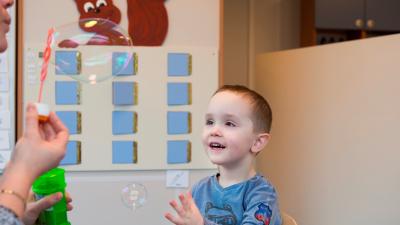Kentalis holds years' of experience and expertise in the field of developmental language disorders (DLD). A DLD is a neurocognitive developmental disorder. Children with DLD process language less proficiently. They experience problems with speaking, understanding language, and/or learning sounds, words, and sentences. Additionally, they are often less capable controlling themselves and understanding their own and other people's thoughts and feelings.
Developmental in nature
This implies that children with DLD deviate from typically developing children with respect to their language and speech development as well as their cognitive and social-emotional development. Moreover, the disorder, being developmental in nature, can result in a variety of problems later on in life.
DLD is quite unknown in society because language disorders are invisible and often difficult to understand. In addition, DLD is frequently confused with other disorders, such as autism or ADHD.
Kentalis Academy
At the Kentalis Academy, we conduct research and develop professional training. Within our neurocognitive perspective on DLD, we explore the relationships between different aspects of respectively language development, social-emotional development, and cognitive development. The role of inner speech within these domains is a specific point of interest in our research. And, of course, the environment (playing a major role in the development of all children) gets the attention it deserves in our theoretical framework and research.

Knowledge development
We combine the scientific knowledge resulting from our and others’ research on DLD with the practice-based knowledge of our colleagues in the care and education departments, with whom we work closely together. Within the process of knowledge development, we also attach great importance to our collaboration with experiential experts, being persons with DLD as well as parents. The resulting expertise is used to enhance the treatment and educational processes within Kentalis and beyond. Additionally, we use our expertise to continually (re)develop the training programs for professionals.
Projects and tools
In our research program on developmental language disorder (DLD), our focus is on neuropsychological development. Bi-/multilingualism is a crucial topic in our work. Below we present three examples of our projects.
Speakaboo
Speakaboo is a tool that allows a speech therapist to screen the speech development of a multilingual child in its mother tongue in only 10 minutes. A speech-language therapist or interpreter can use Speakaboo to elicit target words with the help of small interactive games. Speakaboo can be used with children aged 3-6 years. The program includes additional tools to help speech-language therapists assess speech production in single words in languages not spoken by the therapist.
Interaction
Adolescents with DLD tend to experience more problems in social-emotional functioning compared to their typically developing peers. In this project, we aim to examine the possibility to enhance social-emotional functioning through virtual reality training.
Inner speech in children with DLD
Children with DLD also tend to experience more problems in social-emotional functioning than their typically developing peers do. We focus on gaining insight into the neuropsychological origins of these problems. In this project, we mainly examine the role of inner speech: talking to yourself within your head.
Publications
This section features a selection of (scientific) publications on developmental language disorder, published by Kentalis researchers. Click on the article link to read the full publication.
Arts, Elke, Bram Orobio de Castro, Ellen Luteijn, Ben Elsendoorn, en Constance TWM Vissers. Improving social emotional functioning in adolescents with Developmental Language Disorders: A mini review and recommendations. Frontiers in Psychiatry 13 (2022).
Aussems, K., Isarin, J., Niemeijer, A., Dedding, C. (2022). Working together as scientific and experiential experts: how do current ethical PAR-principles work in a research team with young adults with Developmental Language Disorder? Educational Action Research. October 2022. doi.org/10.1080/09650792.2022.2130386
Smit, L., Knoors, H., Rabeling-Keus, I., Verhoeven, L. & Vissers, C.T.W.M. (2022). Measuring Theory of Mind in Adolescents With Language and Communication Problems: An Ecological Perspective. Frontiers in Psychology, 13. doi.org/10.3389/fpsyg.2022.761434 2021
Camminga, T.F., Hermans, D., Segers, P.C.J. & Vissers, C.T.W.M. (2021). Beyond the senses: How self-directed speech and word meaning structure impact executive functioning and theory of mind in individuals with hearing and language problems. Frontiers in Psychology, 12:798.
doi.org/10.3389/fpsyg.2021.646181
Vissers, C.T.W.M., Tomas E., and Law J. (2020) The Emergence of inner speech and its measurement in atypically developing children. Front. Psychol. 11:279. doi.org/10.3389/fpsyg.2020.00279
Tomas, E. and Vissers, C.T.W.M. (2019) Behind the scenes of developmental language disorder: time to call neuropsychology back on stage. Frontiers Human Neuroscience 12:517. doi.org/10.3389/fnhum.2018.00517
Vissers, C.T.W.M., & Hermans, D. (2018). Social-emotional problems in DHH children from an executive and theory of mind perspective. In H. Knoors & M. Marschark (Eds.), The Oxford handbook of deaf studies in language (pp. x-x). New York: Oxford University Press. doi.org/10.1093/oso/9780190880545.003.0020
Vissers, C.T.W.M., Koolen, S. (2016). Theory of Mind Deficits and Social Emotional Functioning in Preschoolers with Specific Language Impairment. Frontiers in Psychology, 7:1734. doi.org/10.3389/fpsyg.2016.01734
Vissers, C.T.W.M., Koolen, S., Hermans, D., Scheper, A. & Knoors, H. (2015). Executive functioning in preschoolers with specific language impairment. Frontiers in Psychology, 6:1574. doi.org/10.3389/fpsyg.2015.01574
Kentalis International Foundation
At Kentalis International Foundation, Kentalis' international NGO, we are exclusively focused on deafness and hard-of-hearing. We work on knowledge exchange projects with universities, disabled people's organizations, and NGOs in the Global South. Read more about our team and our mission.